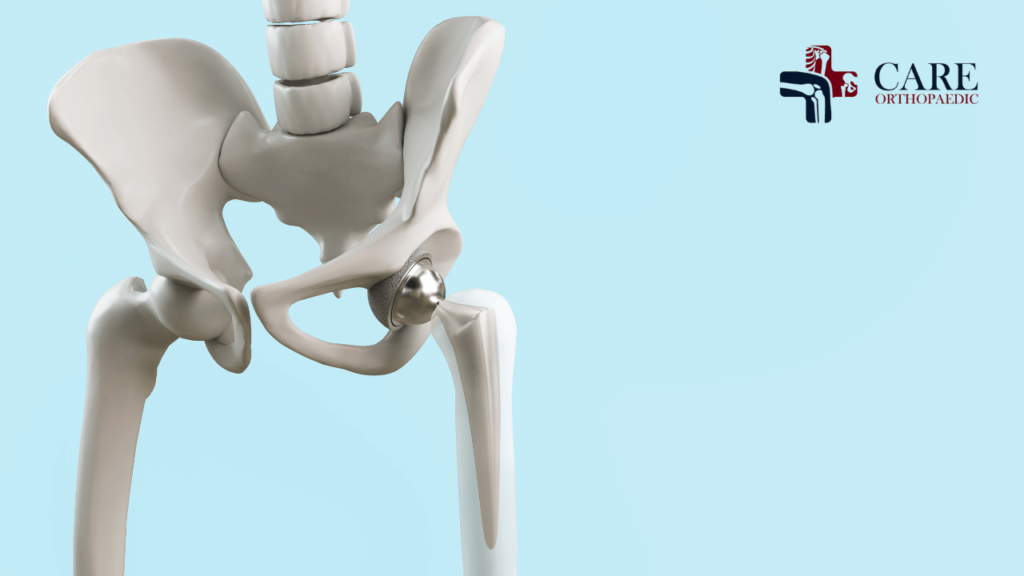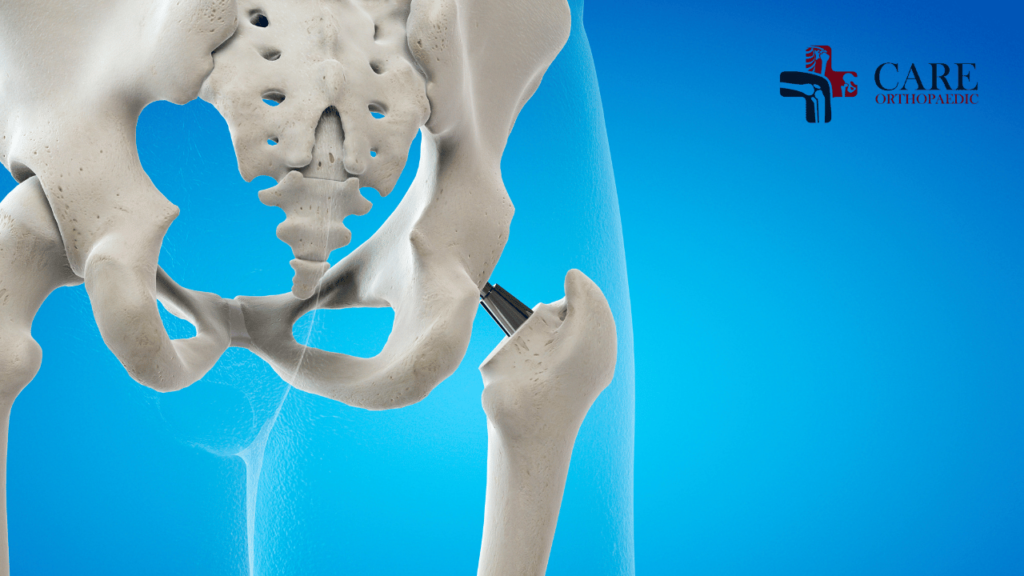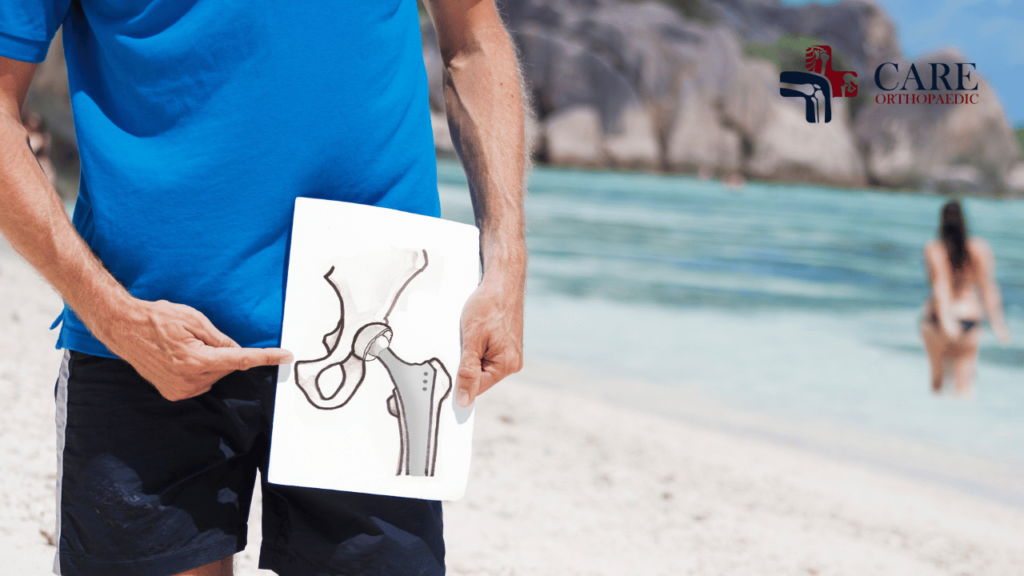Overview
Total Hip Replacement (THR) is recognized globally as one of the most transformative surgical procedures for individuals suffering from severe hip pain and mobility issues. This introduction provides an overview of THR and underscores the critical importance of selecting a specialized facility like CareOrthopaedics in Delhi, which combines top-tier expertise, state-of-the-art technology, and a patient-centered approach to healthcare.

Why Choose CareOrthopaedics for Your Surgery?
Expertise and Credentials: CareOrthopaedics is home to some of the most accomplished Orthopaedic surgeons in the region, each with extensive training and a proven track record in hip replacement surgeries. Our surgeons are not only experts in traditional surgical methods but are also pioneers in minimally invasive techniques that enhance recovery and reduce surgical risks.
Advanced Facilities and Technology: Our medical center is equipped with cutting-edge technology that enables precise and efficient surgical procedures. This includes advanced imaging technologies and robotic surgery systems that assist our surgeons in achieving the best outcomes.
Comprehensive Care Approach: We believe in a holistic approach to treatment, which includes pre-surgery education, personalized surgical planning, state-of-the-art surgical execution, and a detailed recovery and rehabilitation plan tailored to each patient’s specific needs.
What is Total Hip Replacement?
Definition and Background: A total hip replacement involves removing the damaged hip joint and replacing it with a prosthetic implant. This section will explore the history of the procedure, its evolution, and the current best practices that lead to successful outcomes.
Common Reasons for the Surgery: The primary indications for THR include osteoarthritis, rheumatoid arthritis, hip fractures, and other conditions that lead to severe pain and impaired mobility. We will delve into how these conditions affect the hip joint and how replacement can alleviate pain and restore function.
Benefits of Undergoing Total Hip Replacement: Patients typically experience significant pain relief, improved mobility, and a better overall quality of life post-surgery. This section will cover the empirical benefits as reported in medical studies and patient testimonials.

The Surgical Process at CareOrthopaedics
Initial Consultation and Evaluation: Each patient’s journey begins with a thorough consultation, including medical history evaluation, physical examinations, and imaging tests to ensure the most effective surgical plan is crafted.
Surgical Techniques and Innovations: Our facility utilizes both traditional and advanced surgical techniques, including 3D printing of joint components and computer-assisted surgery, to enhance precision and outcomes.
What Patients Can Expect on the Day of Surgery: Detailed walkthrough of the surgery day from arrival at the facility through the post-operative recovery phase immediately following the surgery.
Postoperative Care and Recovery
Immediate Post-Surgery Care: The first hours after surgery are critical for a successful outcome. This section will discuss our protocols for pain management, infection prevention, and monitoring of the patient’s initial recovery.
Rehabilitation and Physical Therapy: Rehabilitation begins almost immediately with the aim of helping patients return to normal activities as quickly and safely as possible. We’ll discuss the typical rehabilitation schedule, the exercises involved, and the role of physical therapy in recovery.
Long-term Health and Lifestyle Adjustments: Long-term success requires adjustments in lifestyle to protect the new hip joint. We provide guidance on activities to avoid, nutritional advice, and other health management strategies.
Preparing for Your Hip Replacement in Delhi
Steps to Get Started with CareOrthopaedics: How to initiate contact, what information you’ll need to provide, and what to expect during your first consultation.
Financial Considerations and Insurance Guidance: An overview of the costs associated with THR, how CareOrthopaedics helps patients navigate insurance claims, and available payment options.
Choosing Delhi for Your Medical Needs: Why Delhi is increasingly chosen by both domestic and international patients for high-quality medical care, including accessibility, advanced healthcare infrastructure, and the availability of expert medical professionals.

Advanced Technologies in Hip Replacement
Innovative Surgical Tools and Techniques: Discussion of the cutting-edge tools and surgical techniques used at CareOrthopaedics, such as robotic-assisted surgery, which offers greater precision and potentially a faster recovery.
Custom Implants and Personalized Surgery: Exploration of how we use technology to customize implants to the specific anatomy of each patient, which can improve the outcome and longevity of the hip replacement.
Understanding Risks and Managing Expectations
Potential Risks and Complications: Although total hip replacement is generally safe, all surgical procedures carry some risk. This section will cover possible complications like infection, blood clots, and hip dislocation, and how CareOrthopaedics minimizes these risks.
Realistic Expectations Post-Surgery: What patients can realistically expect following surgery, including the typical timeline for return to everyday activities and any limitations they might face.
The Role of Diet and Nutrition in Recovery
Nutritional Support for Healing: How a proper diet can aid in faster recovery and what specific nutrients are beneficial during the postoperative period.
Personalized Nutritional Plans: Offering tailored dietary plans that support healing and overall health, developed in consultation with our in-house nutritionists.
Long-Term Care and Follow-Up
Routine Check-Ups and Ongoing Support: The importance of regular follow-up appointments to ensure the longevity of the hip implant and to address any concerns promptly.
Continued Physical Therapy and Exercise: Guidelines on continuing with physical therapy exercises at home and how regular activity can help in maintaining the function of the new hip joint.
Community and Support Resources
Support Groups and Forums: Information about local and online support groups where patients can connect with others who have undergone similar surgeries.
Educational Workshops and Seminars: Regularly scheduled educational sessions that help patients and their families understand all aspects of hip replacement surgery and recovery.
Innovations and Future Directions in Hip Replacement
Research and Development at CareOrthopaedics: Insight into ongoing research projects and future innovations in the field of Orthopaedics that patients at CareOrthopaedics may benefit from.
Emerging Trends in Orthopaedic Surgery: Discussion of global trends in Orthopaedic surgery and how CareOrthopaedics is leading or adapting to these changes to provide the best possible care.

Conclusion
This expanded guide not only underscores CareOrthopaedics dedication to providing state-of-the-art medical treatment but also emphasizes our holistic approach to patient care, which includes preoperative education, advanced surgical options, comprehensive postoperative care, and robust support systems. With a commitment to innovation and excellence, CareOrthopaedics remains a premier choice for total hip replacement in Delhi, continually striving to enhance patient outcomes and satisfaction.
FAQs
1. What is the typical recovery time for a Total Hip Replacement at CareOrthopaedics?
Ans. Recovery times can vary based on the individual’s overall health, the complexity of the surgery, and adherence to rehabilitation protocols. Generally, patients can expect to start walking with assistance the day after surgery. Most patients return to light daily activities within 3 to 6 weeks and fully resume normal activities within 3 to 6 months. Our team provides a personalized recovery plan to help each patient achieve the best possible outcomes.
2. How does CareOrthopaedics ensure the highest standards of safety during Total Hip Replacement surgery?
Ans. At CareOrthopaedics, patient safety is paramount. We adhere to stringent safety protocols that include preoperative health assessments, the use of advanced surgical technologies, and rigorous sterilization processes. Our surgical team is highly experienced and trained in the latest techniques, including minimally invasive procedures that reduce the risk of complications and promote quicker recovery.
3. Can I continue my professional responsibilities remotely during my recovery period?
Ans. Yes, many patients are able to work remotely as they recover from surgery. Depending on the nature of your job, you might be able to start working from home within a few weeks post-operation. We recommend discussing your work plans with your surgeon during the preoperative consultation to tailor your recovery plan accordingly and ensure that you can return to work safely and effectively.
4. What are the latest advancements in Total Hip Replacement that CareOrthopaedics has adopted?
Ans. CareOrthopaedics is at the forefront of Orthopaedic surgery innovations, incorporating advanced techniques like robotic-assisted surgery, which provides greater precision and potentially shorter recovery times. We also use 3D printing technology for creating customized implants tailored to the specific anatomical needs of our patients. These technologies not only improve surgical outcomes but also enhance the overall safety and effectiveness of the procedure.
5. How do I manage long-term care and ensure the longevity of my hip replacement?
Ans. Long-term care is crucial for maintaining the health of your hip replacement. We recommend regular follow-up appointments to monitor the condition of your implant and address any concerns promptly. It’s also important to maintain a healthy lifestyle, including engaging in low-impact exercises such as walking, swimming, or cycling, which can help strengthen the muscles around your hip and keep your joint functioning well. Our team provides ongoing guidance and support to help you manage your health over the long term.


